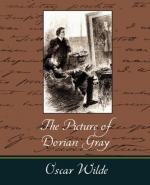As he often remembered afterwards, and always with no small wonder, he found himself at first gazing at the portrait with a feeling of almost scientific interest. That such a change should have taken place was incredible to him. And yet it was a fact. Was there some subtle affinity between the chemical atoms that shaped themselves into form and colour on the canvas and the soul that was within him? Could it be that what that soul thought, they realized?—that what it dreamed, they made true? Or was there some other, more terrible reason? He shuddered, and felt afraid, and, going back to the couch, lay there, gazing at the picture in sickened horror.
One thing, however, he felt that it had done for him. It had made him conscious how unjust, how cruel, he had been to Sibyl Vane. It was not too late to make reparation for that. She could still be his wife. His unreal and selfish love would yield to some higher influence, would be transformed into some nobler passion, and the portrait that Basil Hallward had painted of him would be a guide to him through life, would be to him what holiness is to some, and conscience to others, and the fear of God to us all. There were opiates for remorse, drugs that could lull the moral sense to sleep. But here was a visible symbol of the degradation of sin. Here was an ever-present sign of the ruin men brought upon their souls.
Three o’clock struck, and four, and the half-hour rang its double chime, but Dorian Gray did not stir. He was trying to gather up the scarlet threads of life and to weave them into a pattern; to find his way through the sanguine labyrinth of passion through which he was wandering. He did not know what to do, or what to think. Finally, he went over to the table and wrote a passionate letter to the girl he had loved, imploring her forgiveness and accusing himself of madness. He covered page after page with wild words of sorrow and wilder words of pain. There is a luxury in self-reproach. When we blame ourselves, we feel that no one else has a right to blame us. It is the confession, not the priest, that gives us absolution. When Dorian had finished the letter, he felt that he had been forgiven.
Suddenly there came a knock to the door, and he heard Lord Henry’s voice outside. “My dear boy, I must see you. Let me in at once. I can’t bear your shutting yourself up like this.”
He made no answer at first, but remained quite still. The knocking still continued and grew louder. Yes, it was better to let Lord Henry in, and to explain to him the new life he was going to lead, to quarrel with him if it became necessary to quarrel, to part if parting was inevitable. He jumped up, drew the screen hastily across the picture, and unlocked the door.
“I am so sorry for it all, Dorian,” said Lord Henry as he entered. “But you must not think too much about it.”
“Do you mean about Sibyl Vane?” asked the lad.




